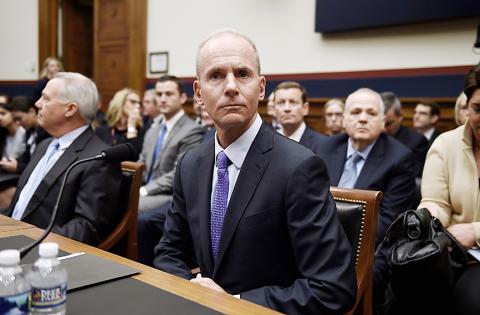Boeing Co new chairman David Calhoun on Tuesday gave embattled CEO Dennis Muilenburg a vote of confidence and said the chief executive is giving up any bonus this year.
Calhoun said the Boeing board believes Muilenburg “has done everything right” and is positioning the Chicago company to return the 737 MAX to service after two accidents killed 346 people.
A flight-control system called the Maneuvering Characteristics Augmentation System (MCAS) pushed the nose of both planes down before crashes in Indonesia and Ethiopia.

Photo: AFP
Boeing, which kept any explanation of MCAS out of pilot manuals, is now revamping the system to make it easier for pilots to override.
“Dennis didn’t create this problem, but from the beginning he knew that MCAS should and could be done better, and he has led a program to rewrite MCAS to alleviate all of those conditions that ultimately beset two unfortunate crews and the families and victims,” Calhoun said on CNBC.
Last week, several members of the US Congress challenged Muilenburg to resign or at least give up pay.
Muilenburg’s compensation last year was US$23.4 million, including a US$13.1 million bonus and US$7.3 million in stock awards.
Stock awards from previous years that vested last year pushed Muilenburg’s haul to more than US$30 million.
Calhoun said Muilenburg called him on Saturday and volunteered to forgo a bonus this year and any stock awards until all MAX jets, including those sitting in Boeing lots, are flying — a process Calhoun said could take at least a year.
Boeing has said that it expects the US Federal Aviation Administration to approve its changes to the MAX before the end of the year.
Those changes include new retraining material for pilots and tying MCAS to a second air-direction sensor at all times so that a single sensor failure will not push the nose down, as happened before both crashes.
However, Muilenburg has conceded that fixing MCAS has taken far longer than Boeing expected.
US airlines are not planning to use the plane until at least January or February, and it could take longer in other parts of the world, where regulators want to conduct their own reviews of Boeing’s work.
Boeing has reported that the MAX grounding would cost it at least US$9 billion in extra production spending and compensation for airlines that have canceled thousands of flights.
The company fired the head of its commercial airplanes division last month, a move that was seen as a reaction to production problems with several planes, not just the MAX. Muilenburg, who became CEO in July 2015, was stripped last month of the chairman’s title.
The board gave that job to Calhoun, a senior executive at the private equity firm Blackstone Group LP who previously led General Electric Co’s jet-engine business and was reported to be in the running for Boeing CEO more than a decade ago.

Quanta Computer Inc (廣達) chairman Barry Lam (林百里) is expected to share his views about the artificial intelligence (AI) industry’s prospects during his speech at the company’s 37th anniversary ceremony, as AI servers have become a new growth engine for the equipment manufacturing service provider. Lam’s speech is much anticipated, as Quanta has risen as one of the world’s major AI server suppliers. The company reported a 30 percent year-on-year growth in consolidated revenue to NT$1.41 trillion (US$43.35 billion) last year, thanks to fast-growing demand for servers, especially those with AI capabilities. The company told investors in November last year that

Intel Corp has named Tasha Chuang (莊蓓瑜) to lead Intel Taiwan in a bid to reinforce relations between the company and its Taiwanese partners. The appointment of Chuang as general manager for Intel Taiwan takes effect on Thursday, the firm said in a statement yesterday. Chuang is to lead her team in Taiwan to pursue product development and sales growth in an effort to reinforce the company’s ties with its partners and clients, Intel said. Chuang was previously in charge of managing Intel’s ties with leading Taiwanese PC brand Asustek Computer Inc (華碩), which included helping Asustek strengthen its global businesses, the company

Taiwanese suppliers to Taiwan Semiconductor Manufacturing Co. (TSMC, 台積電) are expected to follow the contract chipmaker’s step to invest in the US, but their relocation may be seven to eight years away, Minister of Economic Affairs J.W. Kuo (郭智輝) said yesterday. When asked by opposition Chinese Nationalist Party (KMT) Legislator Niu Hsu-ting (牛煦庭) in the legislature about growing concerns that TSMC’s huge investments in the US will prompt its suppliers to follow suit, Kuo said based on the chipmaker’s current limited production volume, it is unlikely to lead its supply chain to go there for now. “Unless TSMC completes its planned six

Power supply and electronic components maker Delta Electronics Inc (台達電) yesterday said it plans to ship its new 1 megawatt charging systems for electric trucks and buses in the first half of next year at the earliest. The new charging piles, which deliver up to 1 megawatt of charging power, are designed for heavy-duty electric vehicles, and support a maximum current of 1,500 amperes and output of 1,250 volts, Delta said in a news release. “If everything goes smoothly, we could begin shipping those new charging systems as early as in the first half of next year,” a company official said. The new